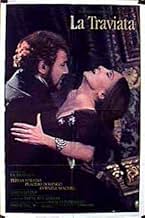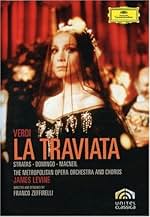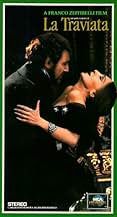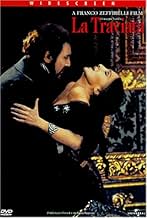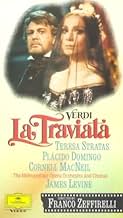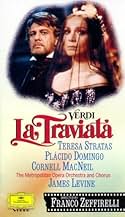AVALIAÇÃO DA IMDb
7,6/10
1,6 mil
SUA AVALIAÇÃO
Retrata o romance entre uma cortesã adoecida e que se encaminha para a morte e um jovem que a amava em segredo e revela seus sentimentos durante uma festa.Retrata o romance entre uma cortesã adoecida e que se encaminha para a morte e um jovem que a amava em segredo e revela seus sentimentos durante uma festa.Retrata o romance entre uma cortesã adoecida e que se encaminha para a morte e um jovem que a amava em segredo e revela seus sentimentos durante uma festa.
- Direção
- Roteiristas
- Artistas
- Indicado a 2 Oscars
- 6 vitórias e 5 indicações no total
Ariel Bybee
- The Voices of
- (canto)
Michael Best
- The Voices of
- (canto)
- Direção
- Roteiristas
- Elenco e equipe completos
- Produção, bilheteria e muito mais no IMDbPro
Avaliações em destaque
10hms66
What glorious music! What Glorious singing! A story bigger than life. Production values that do justice to Verdi's opera. This is grand opera at its grandest. In a scale from 1 to 19, this is a 20.
Generally in opera, the singing is the thing. One puts up with elephantine singers, make believe props, bad acting, and other shortcomings to enjoy the music, and especially, the singing. In this film, none of this annoyances takes place. Teresa Stratas looks beautiful as Violeta should. She sings gloriously as Teresa should. Ditto with Placido Domingo. Unlike some opera singers, both of them can act. The sets are sumptuous, the lighting excellent, the cinematography nonpareil. The direction and editing propel the story without flagging for any moment. This film is as close to perfection as humans can achieve.
Generally in opera, the singing is the thing. One puts up with elephantine singers, make believe props, bad acting, and other shortcomings to enjoy the music, and especially, the singing. In this film, none of this annoyances takes place. Teresa Stratas looks beautiful as Violeta should. She sings gloriously as Teresa should. Ditto with Placido Domingo. Unlike some opera singers, both of them can act. The sets are sumptuous, the lighting excellent, the cinematography nonpareil. The direction and editing propel the story without flagging for any moment. This film is as close to perfection as humans can achieve.
For someone who doesn't particularly like opera to rate this a ten must mean that there is something amazing going on here. It's not just Verdi's music, which is incredible, not just the terrific singing and acting from Stratas (unbelievable performance), Domingo and company, not just Zeffirelli's brilliant direction, but also the beautiful costuming, perfect lighting and out-of-this-world art decoration and set design. And let's not forget the great photography, especially during the ball scenes. It's one of the best musical entertainments ever committed to celluloid - and this from one who loves musicals. It's an unforgettable movie experience - so how is that, as of Dec. 2020, it only rates a 7.0 on IMDB?! Come on people, broaden your horizons and show your appreciation for this brilliant work.
Verdi outdid himself when he penned La Traviata. The cast of singers for this production is superb. The cinematography is appropriately both beautiful and colorful, particularly at the Villa outside Paris.
Stratas is excellent and poignant as Violetta. Domingo makes a most passionate Alfredo. Cornell MacNeil is a splendid Giorgio Germont. Alan Monk is a fine Baron. The cinematography is particularly fine.
All in all this is one of the finest productions of La Traviata ever.
I believe that I have it on both laser disc and DVD.
Stratas is excellent and poignant as Violetta. Domingo makes a most passionate Alfredo. Cornell MacNeil is a splendid Giorgio Germont. Alan Monk is a fine Baron. The cinematography is particularly fine.
All in all this is one of the finest productions of La Traviata ever.
I believe that I have it on both laser disc and DVD.
10preppy-3
A filmed version of Guiseppe Verdi's opera. It's about a love affair between beautiful Violetta Valery (Teresa Stratas) and Alfredo Germont (Placido Domingo). Their love for each other is torn apart by his father--but she still loves him. It all leads to a tragic end.
I saw this in a theatre back in 1982. They tried to play it like an opera. When I walked in the screen was covered by a red curtain (back in those days some of the older theaters still had curtains). As the lights went down the curtain parted and the film began. When the film ended, the curtains pulled back together and the lights came up. My audience applauded even after the lights were up. It gave the feeling of being at a live opera. That can't be recreated at your home but this film is still well worth seeing.
Director Franco Zeffirelli wisely did not film the opera as it is staged. He opened it up--this was set up for a film. Sequences take place outside and the inside sets are way too elaborate for an actual opera.
The costumes are beautiful and the sets are just stunning--full of color and light. Every moment of this picture is filled with beautiful imagery. It matches perfectly with the singing and the music which are just incredible. There's even a show-stopping matador dance half-way through! I've never seen the opera but I've heard this is very faithful and Stratas and Domingo have beautiful voices and also can act! The only negative here is that Domingo is way too old for his role...but that can be forgiven whenever he sings.
This was actually a sizable hit back in 1982. The same team got together a few years later and filmed "Othello". Surprisingly that was TERRIBLE and is a textbook example of how NOT to do an opera! But this one is just great and a must-see. I give it a 10.
I saw this in a theatre back in 1982. They tried to play it like an opera. When I walked in the screen was covered by a red curtain (back in those days some of the older theaters still had curtains). As the lights went down the curtain parted and the film began. When the film ended, the curtains pulled back together and the lights came up. My audience applauded even after the lights were up. It gave the feeling of being at a live opera. That can't be recreated at your home but this film is still well worth seeing.
Director Franco Zeffirelli wisely did not film the opera as it is staged. He opened it up--this was set up for a film. Sequences take place outside and the inside sets are way too elaborate for an actual opera.
The costumes are beautiful and the sets are just stunning--full of color and light. Every moment of this picture is filled with beautiful imagery. It matches perfectly with the singing and the music which are just incredible. There's even a show-stopping matador dance half-way through! I've never seen the opera but I've heard this is very faithful and Stratas and Domingo have beautiful voices and also can act! The only negative here is that Domingo is way too old for his role...but that can be forgiven whenever he sings.
This was actually a sizable hit back in 1982. The same team got together a few years later and filmed "Othello". Surprisingly that was TERRIBLE and is a textbook example of how NOT to do an opera! But this one is just great and a must-see. I give it a 10.
A path of education...
Art of high achievement influences many eternally and profoundly. Maybe he was not as accomplished as his good old dad, Alexandra Dumas Fils made his own work a classic household name which is well-remembered and appreciated.
I first heard about "Cha Fa Nui" (Camille) from the mouth of my mother when I was still an upper primary school girl. To a young Chinese girl, this meant nothing at all but I went to the public library and found that there were many copies with this title translated by Taiwanese. I never finished reading it because the names are too long and the Chinese is too literary, I was bored to death by it. The only thing I remembered was that it was a French novel. Dropped, the book, but not the name.
A few years later in the early 80's, Franco Zeffirelli's operatic movie with Chinese title as "Cha Fa Nui" was on show in one and only one movie house, "Palace" at Causeway Bay (demolished!). At that time, this prestigious cinema showed mostly western movies of big names like Gone with the Wind, Casablanca, Dr. Zhivago and so "La Traviata" was one of them.
Hong Kong Chinese were then not very familiar with Western culture, the cinema staff had even misplaced Plácido Domingo's name as "Domingo Plácido" on the billboard. I, as a teenager, was a little intimidated by the movie house by its reputation and grandeur. Yet, out of curiosity, in those fearless, carefree and innocent days, imitating the adults with good taste, I bought a ticket to see this movie. And it was a WOW, what an eye-opening experience!
The vision, the music, the powerful opera singing, the acting and the poetic cinematography, the wondrous costumes and hairdo, it was an educational adventure to a young life. (So, until now I still don't understand how come the man at one row before me could be sleeping and snoring so annoyingly while his girlfriend/wife/sister was staring hard on the screen without moving her head.) Everything is unforgettable about this movie. The happy time of the lovers that Violetta once fell off into a shallow brook from the narrow wood plank. The histrionic and comical fit of Alfredo when he was struggle to open that fateful letter from Violetta. And the most excruciating of all, I can still feel the deafening horror that the deserted and seriously ill Violetta was standing desertedly in the cruelly empty and stripped big house, letting out piercing shriek of pain.
The subsequent episode is an educational search for me: I looked for abridged version of "Cha Fa Nui" in English "Camille" and found out that the names of the original protagonists were Marguerite Gautier and Armand Duval but not those in the operatic adaptation as Violetta Valery and Alfredo Germont. Furthermore, the book inspired Giuseppe Verdi first to make it into an opera but not Franco Zeffirelli's movie.
And five years later, I learned some French and so, dared to touched the original "La Dame aux Camélias". Later, I learnt from an Italian lady that the name of Verdi's opera "La Traviata" was derived from an Italian verb "traviare" which means "to mislead", "to lead astray", or "to corrupt". Thus, a "corrupted man" is a "traviato" and so "the fallen woman" or "the corrupted woman" is "La Traviata". And the book has inspired every generation's film-makers or TV producers, so far there are more than forty adaptations. Well, well, well, what a job all through the years.
What's more interesting, I once read from an oddly-enough page about the Brits' Prince Charles. It is reported that his favourite opera is "La Traviata", and my eyebrows arched. Of course, his loved one is named "Camilla", and strictly speaking by royal standard, she is a "fallen" (committed adultery + divorced) woman.
Art of high achievement influences many eternally and profoundly. Maybe he was not as accomplished as his good old dad, Alexandra Dumas Fils made his own work a classic household name which is well-remembered and appreciated.
I first heard about "Cha Fa Nui" (Camille) from the mouth of my mother when I was still an upper primary school girl. To a young Chinese girl, this meant nothing at all but I went to the public library and found that there were many copies with this title translated by Taiwanese. I never finished reading it because the names are too long and the Chinese is too literary, I was bored to death by it. The only thing I remembered was that it was a French novel. Dropped, the book, but not the name.
A few years later in the early 80's, Franco Zeffirelli's operatic movie with Chinese title as "Cha Fa Nui" was on show in one and only one movie house, "Palace" at Causeway Bay (demolished!). At that time, this prestigious cinema showed mostly western movies of big names like Gone with the Wind, Casablanca, Dr. Zhivago and so "La Traviata" was one of them.
Hong Kong Chinese were then not very familiar with Western culture, the cinema staff had even misplaced Plácido Domingo's name as "Domingo Plácido" on the billboard. I, as a teenager, was a little intimidated by the movie house by its reputation and grandeur. Yet, out of curiosity, in those fearless, carefree and innocent days, imitating the adults with good taste, I bought a ticket to see this movie. And it was a WOW, what an eye-opening experience!
The vision, the music, the powerful opera singing, the acting and the poetic cinematography, the wondrous costumes and hairdo, it was an educational adventure to a young life. (So, until now I still don't understand how come the man at one row before me could be sleeping and snoring so annoyingly while his girlfriend/wife/sister was staring hard on the screen without moving her head.) Everything is unforgettable about this movie. The happy time of the lovers that Violetta once fell off into a shallow brook from the narrow wood plank. The histrionic and comical fit of Alfredo when he was struggle to open that fateful letter from Violetta. And the most excruciating of all, I can still feel the deafening horror that the deserted and seriously ill Violetta was standing desertedly in the cruelly empty and stripped big house, letting out piercing shriek of pain.
The subsequent episode is an educational search for me: I looked for abridged version of "Cha Fa Nui" in English "Camille" and found out that the names of the original protagonists were Marguerite Gautier and Armand Duval but not those in the operatic adaptation as Violetta Valery and Alfredo Germont. Furthermore, the book inspired Giuseppe Verdi first to make it into an opera but not Franco Zeffirelli's movie.
And five years later, I learned some French and so, dared to touched the original "La Dame aux Camélias". Later, I learnt from an Italian lady that the name of Verdi's opera "La Traviata" was derived from an Italian verb "traviare" which means "to mislead", "to lead astray", or "to corrupt". Thus, a "corrupted man" is a "traviato" and so "the fallen woman" or "the corrupted woman" is "La Traviata". And the book has inspired every generation's film-makers or TV producers, so far there are more than forty adaptations. Well, well, well, what a job all through the years.
What's more interesting, I once read from an oddly-enough page about the Brits' Prince Charles. It is reported that his favourite opera is "La Traviata", and my eyebrows arched. Of course, his loved one is named "Camilla", and strictly speaking by royal standard, she is a "fallen" (committed adultery + divorced) woman.
Você sabia?
- CuriosidadesItalian censorship visa # 78579 delivered on 17 February 1983.
- Trilhas sonorasLa Traviata
Written by Giuseppe Verdi
Libretto by Francesco Maria Piave
Performed by the cast of this film and The Metropolitan Opera Orchestra and Chorus
Directed by James Levine
Principais escolhas
Faça login para avaliar e ver a lista de recomendações personalizadas
- How long is La Traviata?Fornecido pela Alexa
Detalhes
Bilheteria
- Faturamento bruto nos EUA e Canadá
- US$ 3.783.329
- Faturamento bruto mundial
- US$ 3.783.329
Contribua para esta página
Sugerir uma alteração ou adicionar conteúdo ausente



